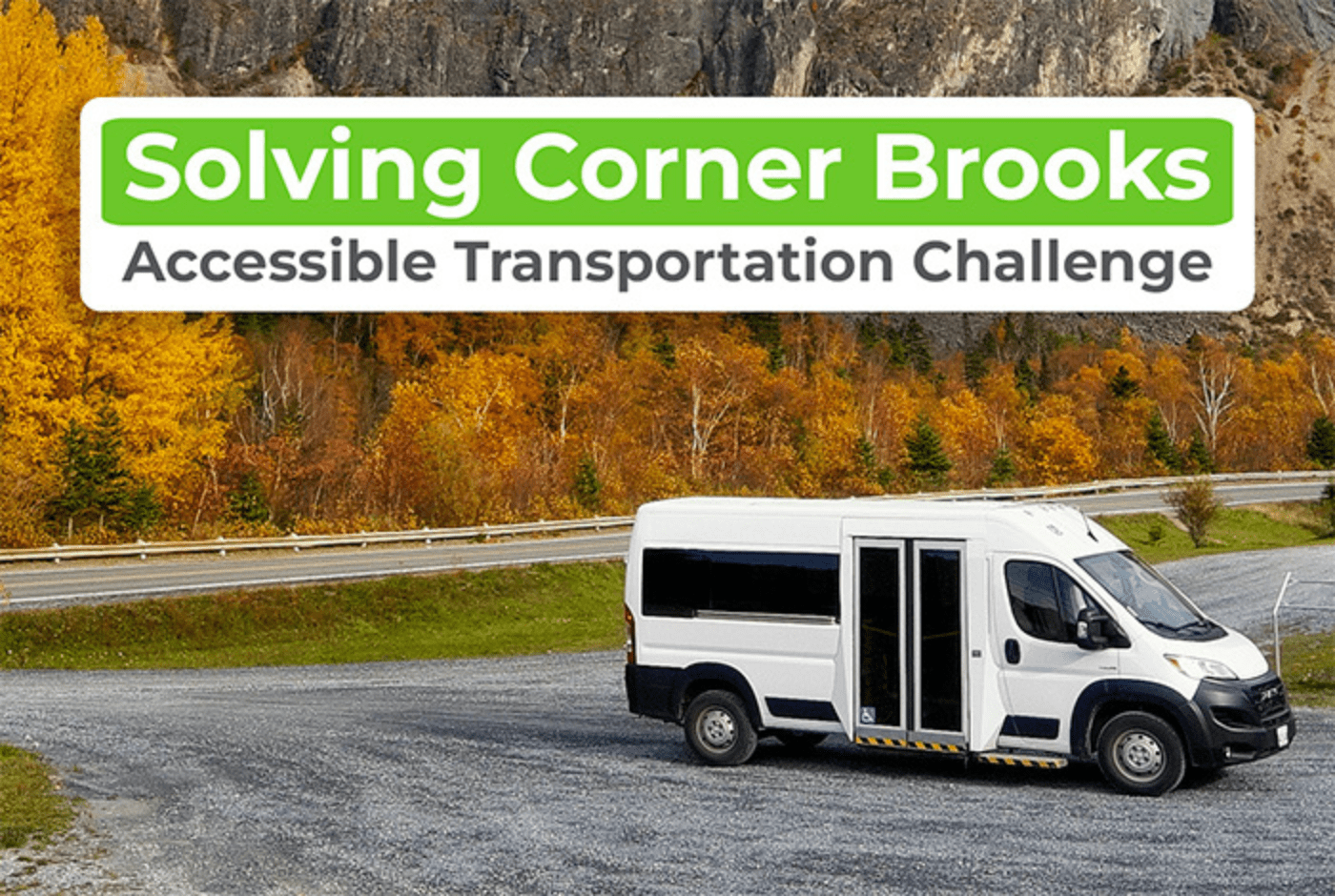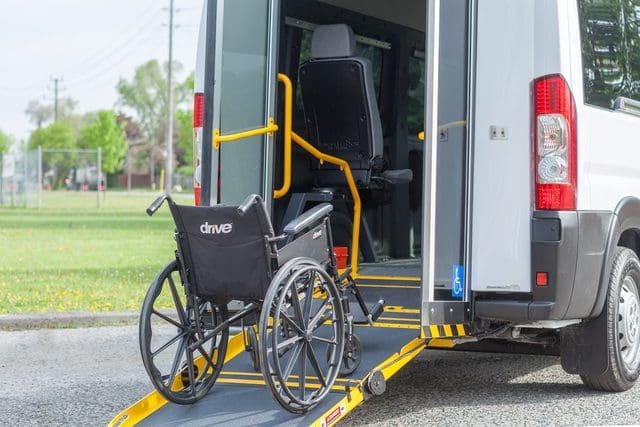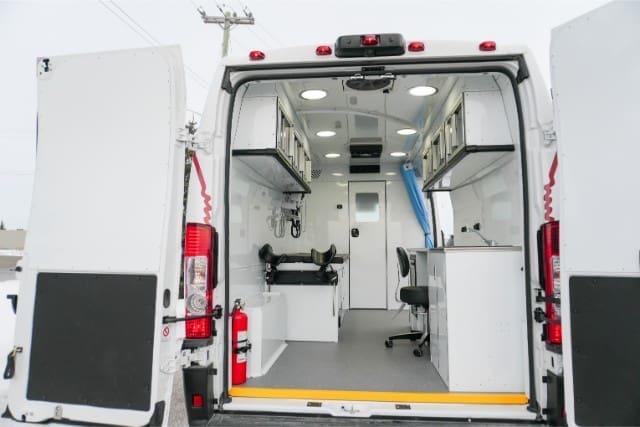From a traditional payment to leasing to financing your accessible or mobile medical vehicle, how do you know which payment option is right for your organization?
You could get into big trouble if you don’t pick the right one. Not being able to make monthly payments, going into debt, or sacrificing funds for other services your organization offers to be able to afford the van could all become a horrifying reality for your organization.
At MoveMobility, we understand all of these options can be confusing. In this article, you’ll learn the answers to the four most popular questions we get about payment options with us as a specialty vehicle manufacturer:
1. What are your payment options?
2. What are their differences?
3. What are the pros and cons of each option?
4. Who is each option right for?
What are the 3 payment options available at MoveMobility?
There are 3 main payment methods that dealerships and manufacturers typically offer in the specialty vehicle industry:
1. Traditional purchasing (or buying outright)
2. Commercial Leasing
3. Personal Financing
Traditional purchasing of a wheelchair van
When you choose to purchase, you pay an upfront deposit (generally between $25,000 and $50,000) before we assign a vehicle to your name and schedule it for production.
Once your vehicle is converted, you pay the remaining amount before we deliver it to you.
Pros of purchasing your wheelchair or mobile medical van
1. One to two payments, and you’re done
The main pro of making an outright purchase is that, for the most part, it’s one and done.
You don’t have to worry about making monthly payments, a kilometer restriction, etc.
2. You don’t pay the full amount until the van is converted
At MoveMobility, you don’t pay the full amount until your van is fully converted. This can offer a sense of comfort to some clients.
90 percent of our clients buy their van outright instead of leasing or financing.
Cons of purchasing your wheelchair/mobile medical van
1. Big initial purchase
The biggest downside to purchasing your wheelchair or mobile medical van outright is that you need all of the funds available to complete the purchase. Like other capital equipment purchases, specialty vans are a big investment because they require the highest level of safety and quality.
If you plan to purchase a specialty vehicle, find out about wheelchair van costs and mobile medical van costs.
Commercial leasing for converted vans
Please note: Leasing with MoveMobility is for commercial use only, meaning we do not offer a leasing option for personal users.
When leasing a wheelchair or mobile medical van, you’ll likely pay monthly payments for 1, 3, or 5 years. This lets you spread the cost of the van out over time, which can be a better fit for some organizations’ budgets or cash flow.
When you lease a van, you don’t own the van at the end of the fixed period of time, but you can buy it if you want by paying the buyout amount you agreed to.

Pros of commercially leasing your converted van
1. Lower payments
When you lease your van, you’ll typically pay a down payment and then monthly payments from there. MoveMobility’s leasing partners often offer $0 down payments.
This can be a great option if you know you need a converted van soon but don’t have all the funds available upfront.
2. New van every couple of years
For organizations whose wheelchairs or medical vans are used daily, you may find you need to replace or repair your van frequently.
This can be very expensive. So, leasing can be a great option if you have a fleet of multiple vans or need to replace vans every few years. Learn more about the benefits of leasing a wheelchair van from this BraunAbility article.
Cons of leasing your converted van
1. Potential kilometer restriction
Some leasing companies offer vehicle leases with unlimited mileage restrictions, which means you can drive the vehicle as much as you want without incurring an extra charge.
However, if your lease has a mileage restriction, you may be charged extra at the end of the term if you return the vehicle with more kilometers than you agreed to in your contract.
At MoveMobility, you can lease a wheelchair or mobile medical van with no mileage restriction.
Financing a wheelchair van (for personal users only)
Similar to leasing, financing involves paying incremental amounts of money each month until the vehicle is fully paid off. However, when you finance your wheelchair van, you own it once you’ve paid it off.
Pros of financing your wheelchair van
1. Lower payments mean you can actually afford a wheelchair van
Financing a wheelchair van can give some personal users the ability to actually afford a wheelchair van.
If you’re buying a wheelchair van for personal reasons –such as for your family or yourself– then this can be a great option for you. By breaking the cost of a van down into manageable monthly payments, families can budget accordingly.
2. You own your wheelchair van once you’ve paid it off
Financing your wheelchair van allows you to own it once you’ve made your final payment.
Again, financing can be a great option for you if you’re buying a wheelchair van for personal reasons.
Cons of financing your wheelchair van
1. Financing is not best for businesses or companies that frequently replace vans
If you own the vehicle at the end of the finance, you’re responsible for selling or continuing to use it. Some organizations find this inconvenient, especially if they frequently replace their vans.
2. Interest rates may impact affordability
In recent years, interest rates have been between 4% and 8%.
The higher the interest rate, the more you will pay for the van over the finance term.
Who is each payment option right for?
Knowing which payment option is right for you can be difficult, so here are some traits you can look for in your organization to help you decide.
Who is traditional purchasing right for?
- Organizations that budget for an upfront payment
- Organizations that have funding or government grants
Who is commercial leasing right for?
- Organizations that frequently replace their wheelchair vans
- Nonprofits that may not have the funding needed to pay for the van all at once
Who is personal financing right for?
- Personal users who don’t have the budget for an outright payment or want to split the amount into monthly payments
Your next steps for choosing a payment option with MoveMobility
You came to this article to learn about the different payment options with MoveMobility.
Now, you know we offer traditional purchasing, commercial leasing, and personal financing. You also know the pros and cons of each option and generally who each one is right for.
At MoveMobility, we understand how difficult choosing the right payment option for your organization can be.
Learn more about how you can customize your payment plan and talk to a MoveMobility expert today.
Or, continue your research journey and check out these related articles:





